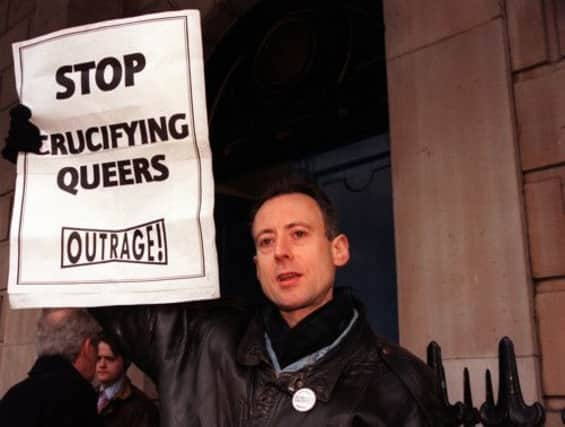Rift deepens over same-sex marriage education


The warning came as gay rights campaigners warned teachers were “paralysed” over mentioning sexuality in schools and some were still unsure about what they could say.
For their part, Catholic school leaders have voiced fears they could face court action if they teach their “sacramental” view of marriage as always being between a man and woman.
Advertisement
Hide AdAdvertisement
Hide AdThe controversial Clause 28 measure, introduced by the Thatcher government in the 1980s, banned teachers from “intentionally promoting” homosexuality in their lessons.
Known as Section 2A in Scotland, it was repealed in the late 1990s but only after angry opposition from supporters, bankrolled by transport magnate and SNP donor Brian Souter.
The first gay marriages are set to be held in Scotland in 2015 if the Scottish Government’s Marriage and Civil Partnership Bill is passed.
Holyrood’s equal opportunities committee is taking evidence on the changes and Tory Alex Johnstone said yesterday he would be voting against the measures, describing himself as a veteran of the Section 2A debate. “My concern is that changes in the law in this case would ignite a similar, perhaps parallel debate over how we teach and how we react in the classroom,” he said.
Ruth Hunt, of gay rights campaign group Stonewall, said it was “absolutely right” to remind people about the impact of Section 2A in Scottish schools.
“The fundamental impact is that teachers felt absolutely unable and paralysed to talk about anything relating to sexual orientation at all,” she said.
“That legacy still lives on in our schools. There are some teachers who still think that legislation exists, there are some who know it has been repealed but don’t know what that means in terms of what they can do.
“What that leads to is that there’s very little reference at all at the moment to lesbian, gay and bisexual relationships in any classroom, faith or no faith.
Advertisement
Hide AdAdvertisement
Hide Ad“What this legislation has done is reopen that discussion and I think it will give teachers the opportunity to think about how they can talk about these issues.”
There have been fears over the impact of the changes on teachers in the hundreds of Catholic schools in Scotland.
John Brown, Catholic Education Commission member with the Scottish Catholic Education Service, said the bill was seeking to redefine marriage.
“If we’re in a Catholic school, we would be teaching the idea of marriage as between a man and a woman. That is that sacramental element within a Catholic school,” he said.
“It doesn’t prevent me from stating that some people live different lifestyles and deserve respect for that. My worry is that if I say in a classroom, or a teacher says in a classroom, ‘I do not believe this to be marriage in the sense that we understand marriage’, then are we liable to be attacked or taken to court, against something that the state has promulgated for.
“We really need to have some sort of legal protection within the bill in order to be able to say that within the Catholic understanding of marriage, this is what we believe.”
But Stephen McCrossan, national officer for education and equality, with teaching union the EIS, said if any teacher had a difficulty, they could “flag up” their concerns and other arrangements would be made in the school.
Schools also have a responsibility, through the duty of equality in the public sector, to “respect the beliefs of that individual teacher”, he said.
Advertisement
Hide AdAdvertisement
Hide AdMr McCrossan said he could find no record of cases at national level where disciplinary measures had been brought against teachers who said teaching material went against their religious beliefs.
“That would indicate they’re being dealt with at a local level or they’re simply not happening at all,” he said.
ELSEWHERE